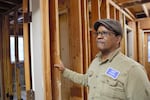
Stuart Wells, the executive director of the group formerly known as Portland Audubon, takes a look at construction at the nonprofit's animal hospital on March 1, 2023. It was extensively damaged in a flood this winter.
Kristian Foden-Vencil / OPB
Portland Audubon isn’t just another bird club. It’s one of the oldest and largest local chapters of the National Audubon Society.
The nonprofit was started 121 years ago and today owns 172 acres of lush woodland in Portland’s Northwest hills, as well as wildlife sanctuaries in Sandy and Yachats.
The 12,000 members also don’t just look at birds. They restore habitat, from the Malheur National Wildlife Refuge to the coast. They educate kids, run an animal hospital and fund a legal department that fought to protect the northern spotted owl and the marbled murrelet.
“Portland Audubon has been a leader in the conservation field for its existence,” said Stuart Wells, the group’s executive director.
Now, he says, they’re leading again by dropping Audubon from the nonprofit’s name.
John James Audubon was an American artist, adventurer and naturalist. He’s best-known for his book “The Birds of America,” which was published in 1827 with 435 stunning, life-size watercolors of birds. Every now and then a first edition copy comes up for auction and sells for as much as $7 million.
“As a kid, I can remember looking at these and saying, ‘Wow, I can really see all of the detail of this bird,’” Wells said. “It’s just extraordinary the work that’s done.”
Like other naturalists of his day, Audubon didn’t sit up in a tree to paint those birds. He shot and killed birds, by the thousands, to study them up close and to build a better understanding of their biological classifications. But it’s his treatment of human beings that is the biggest issue for the local chapter.
“John James Audubon was a slaveholder,” Wells said.
Nine people were enslaved at Audubon’s home in Kentucky. Writing to his wife in 1834, he criticized the abolitionist movement, saying the British had “acted imprudently and too precipitously” in emancipating people in territory they controlled.
“He also would dig up native American graves and sell body parts,” Wells said.
Audubon sold skulls to people working on the debunked pseudoscience of phrenology, which tried to link head shapes with racial superiority.

The group formerly known as Portland Audubon leads a broad array of animal protection and conservation efforts.
Kristian Foden-Vencil / OPB
Wells said John James Audubon actually had little to do with the naming of the National Audubon Society.
Founder George Bird Grinnell chose the name to honor his tutor, Lucy Audubon, who was John James Audubon’s widow.
But Wells concedes, there is an inescapable association.
“Our mission as an organization is one of inclusion and equity and this kind of moniker isn’t consistent with that mission,” Wells said. “In fact, it can be a barrier to people of color, especially Black people.”
A number of staff and volunteers at Portland Audubon are people of color, including Wells. He said the name is a painful reminder of the past and dropping it might help more people feel welcome in nature.
“The woods were dangerous places for people of color,” Wells said. “You’re isolated. You don’t have a connection to folks that might provide protection.”
Portland Audubon’s name change comes as the whole nation wrestles with nomenclature.
In the city, high schools named for Presidents James Madison and Woodrow Wilson have been renamed to honor long-time educator and community leader Leodis McDaniel, and civil rights activist and journalist, Ida B. Wells-Barnett. The changes are in response to concerns about the racist actions of the two presidents.
“The social reckoning that’s been occurring in this country, is bringing these kinds of things to light,” Wells said.
Kerry Tymchuk, the head of the Oregon Historical Society, said when using names of people from the past, it’s key that their history be told in a thorough way, not just the flattering parts.
“What’s important to do is to tell the whole story,” he said. “And to be honest about it.”
Portland Audubon is one of 450 branches of the National Audubon Society. Wells said local society supporters have been waiting for the headquarters to drop the name. That hasn’t happened yet.
So Portland now joins local chapters in Seattle, Chicago and elsewhere that have dropped Audubon on their own.
Seattle’s website is now labeled simply Seattle, with Audubon crossed out.
Portland conservationists haven’t yet adopted a new name for their chapter. They’re still hoping the national organization will come up with something acceptable.
In a statement, the National Audubon Society said it’s in the midst of “a robust decision-making process,” and that it has not set a date for a decision.

